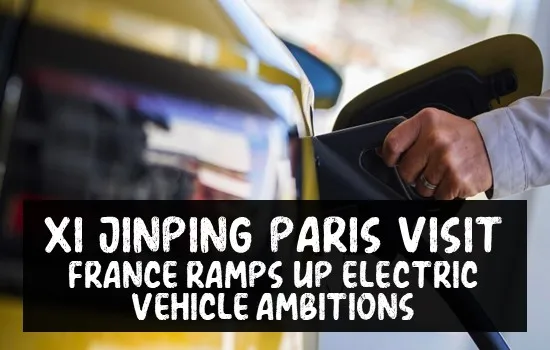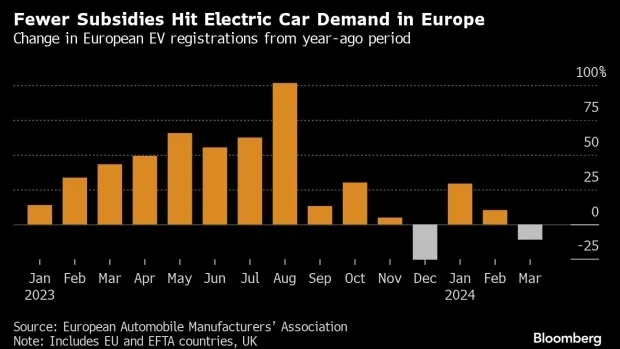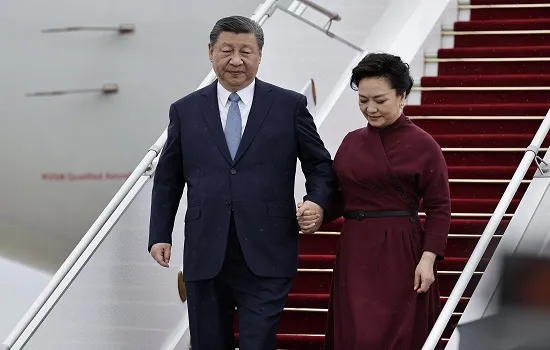France is looking to increase the sales of electric vehicles substantially over the next few years. The country has signed a new agreement with its auto industry that aims to quadruple the sales of fully electric vehicles by 2027. It wants electric cars and light commercial vehicles to account for bigger portions of total sales each year. This deal was signed on the same day as Chinese President Xi Jinping’s visit to Paris began. Their talks are expected to focus on trade and the electric vehicle industry where tensions have risen.
The agreement between the French government, businesses and unions targets 800,000 electric car sales annually by 2027. This would represent a huge 400% jump from current sales numbers. Sales of electric light commercial vehicles are projected to surge even more by 600% to 100,000 vehicles per year. While exact figures on new EV subsidies were not revealed, France plans to continue supporting purchases and leases through financial incentives. The 30-page contract also covers building up domestic production capacity and supply chains for electric car batteries and critical materials.

President Xi’s visit started at a time of growing competition between France, China and Europe in EVs. With its large factories and government backing, China accounted for 45% of global EV sales last year according to some estimates. Chinese automakers are keen to export more EVs worldwide. However, European leaders fear a possible influx that undercuts their own industries. Just this October, the European Commission launched an anti-subsidy investigation against Chinese EVs entering Europe. France now limits cash rebates only to the lowest emission EVs as another step to favor local production over imports.
The trade disagreements between China and Europe on EVs are a major issue during Xi’s France trip. He will meet with both President Macron and European Commission chief Ursula von der Leyen to address rising tensions. This follows a Chinese anti-dumping investigation on European wines like French cognac, hitting back at EU trade actions. The French government’s new EV rules de facto ban many Chinese models from subsidies through stricter emissions standards tied to vehicle manufacturing processes. However, Finance Minister Bruno Le Maire also said they welcome Chinese automaker BYD opening factories in France to build EVs locally as Toyota has done.
The EV deal aims to support over 100,000 green jobs in the French auto industry during its transition away from combustion engines. In addition to sales targets, it includes measures to boost innovation, retrain workers, strengthen domestic supply chains and double the number of charging stations nationwide to around 100,000 by 2022. As one of Europe’s largest auto producers, France’s push to dramatically increase EV adoption could also encourage similar moves by other EU nations. This would in turn grow the local market for manufacturers and batteries as the future of transportation shifts to zero emissions mobility.

The new EV targets that France agreed to are ambitious but necessary if it wants to become a leader in the growing electric vehicle market. Experts estimate that electric cars may make up over 50% of total sales in Europe by 2030, so nations are competing to capture more of that demand. Reports indicate that Chinese automakers have made major inroads into Norway, the leading EV country globally. France hopes increased subsidies and supporting local battery production will help cushion the effects of foreign competition while transitioning its autos sector for the green economy. Only by boosting EV infrastructure and coordination between automakers, unions and government can France achieve its goal of having more sustainable roads for future generations.
While the ambitious EV targets were unveiled during Xi’s visit, tensions between France and China run deeper. Several French lawmakers recently accused Huawei of spying on behalf of China, leading to calls for a ban on the company’s equipment for 5G mobile networks. Both countries have also seen protests over alleged human rights issues in Xinjiang and Hong Kong. However, Macron is walking a fine line of pushing back against Beijing while pursuing more Chinese investment needed for France’s economic recovery. During talks, Macron is expected to raise concerns directly with Xi while exploring cooperation on green tech.
Another issue is the European Commission’s antitrust investigation into China’s battery supply chain launched last month. It questions whether Beijing-backed projects in Europe amount to illegal state aid. Battery cells are a bottleneck for the auto industry globally as makers scramble to secure supplies. Chinese firms already have a large presence in Europe and seek control over more of the EV value chain from mining to batteries. This has raised alarm among EU leaders protecting strategic industries and frustrated French efforts to develop its domestic battery champion.

Differences in industrial policy approaches remain a key challenge. While France drives EV adoption through bans and quotas, China massively subsidizes manufacturers and battery startups. Beijing’s Made in China 2025 plan aims for leadership across ten key advanced industries in this decade, including new energy vehicles. Some fear this puts European firms at a disadvantage unless they receive comparable backing. However, protectionist moves risk deteriorating relations with China, a crucial export market and source of investment. Success will depend on finding balanced solutions both sides find fair.
Lastly, EV promotion requires not just policy support but also an ecosystem of recharges. France charging network only has 29,000 public charging points currently versus 250,000 planned by 2022. This gap threatens electric dreams as incomplete infrastructure deters buyers. Local authorities are working overtime with utilities to deploy pavement chargers nationwide for accessibility. Still, better coordination with automobile lobbies and coordination for highway chargers will smooth the shift to clean mobility. Only a collective push from industry and government together makes electric highways a reality.


